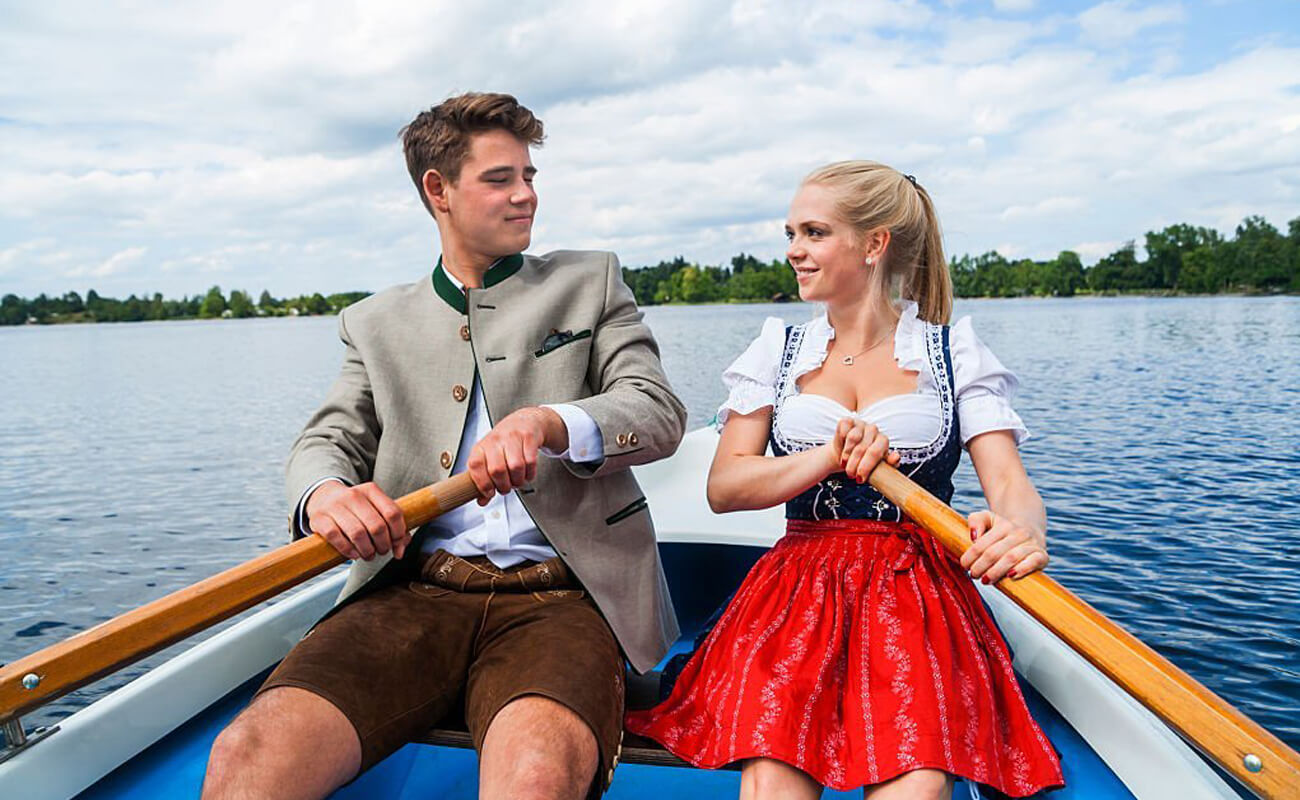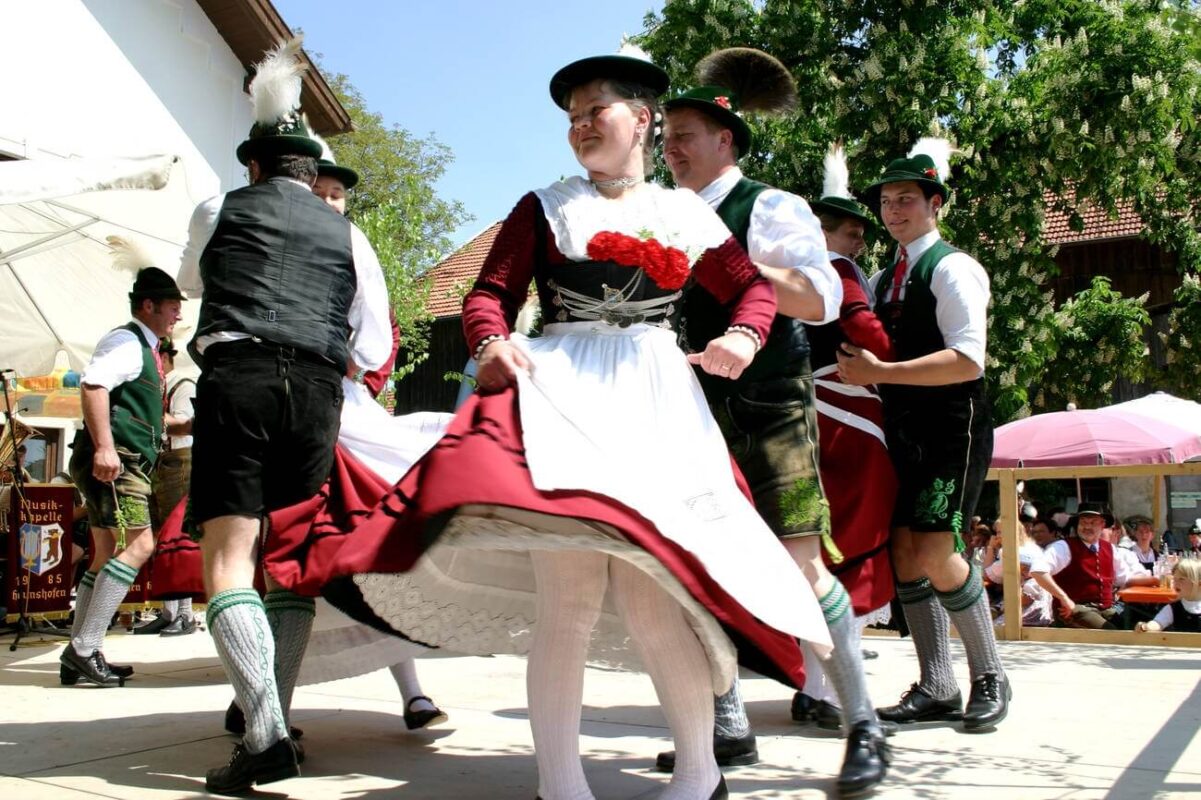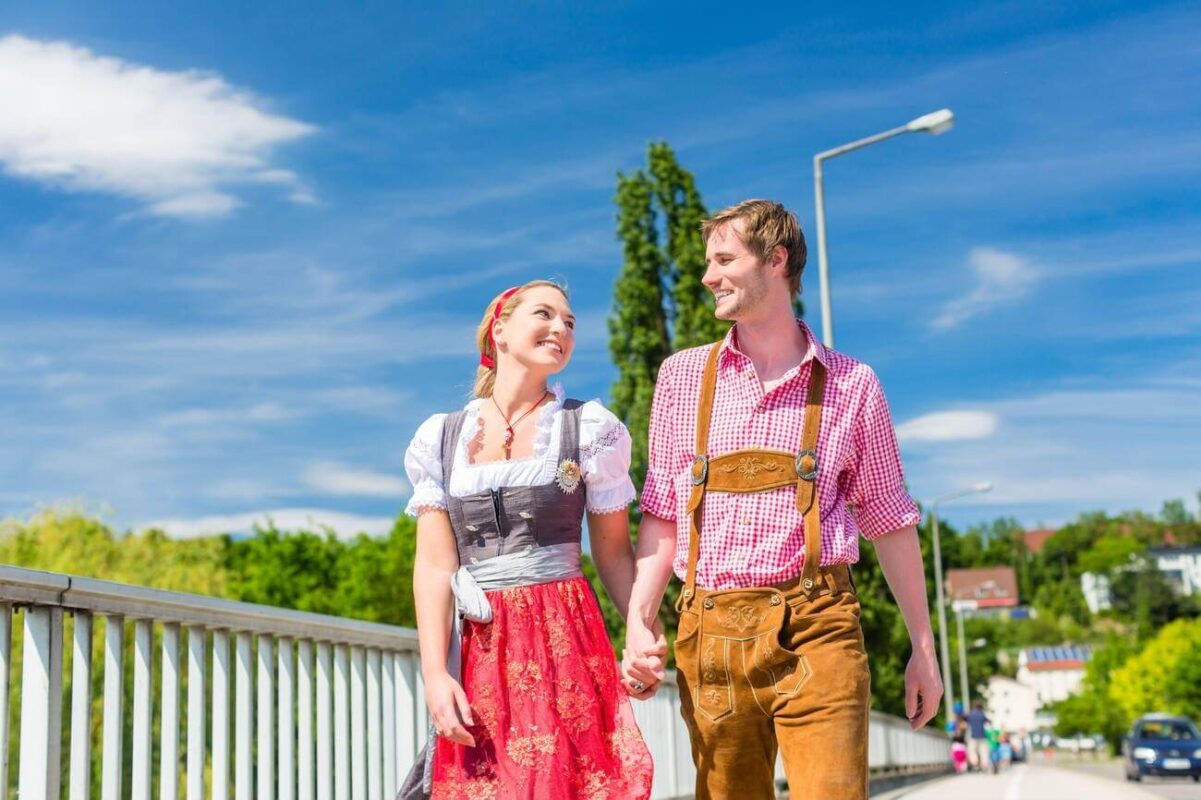How Are Bavarians Different From other Germans?

8 Ways Bavarians Stand Out from Other Germans
Nestled in the heart of Germany, Bavaria shines as a gem with its rich history and cultural vibrancy. Known for its picturesque landscapes, quaint villages, and hearty cuisine, Bavaria stands out not just geographically but culturally too. Within the tapestry of German identity, Bavarians weave their unique thread, fostering a distinctiveness that sets them apart from their compatriots.
While Germany boasts diversity across its regions, Bavaria proudly flaunts its individuality through traditions deeply rooted in folklore and history. From the iconic attire of Lederhosen and Dirndls to the lively celebrations at Oktoberfest, Bavarians exude a charm unlike any other in Germany. With a dialect as hearty as their Weisswurst breakfasts and beer gardens as vibrant gathering spots, Bavarians embody a sense of pride that transcends mere citizenship – it’s a beacon of regional heritage within the German nation.
1. Traditional Clothing and Culture
Bavarians are well-known for their rich traditional clothing that reflects a deep sense of cultural identity. One iconic attire for Bavarian men is the Lederhosen, leather shorts often accompanied by suspenders and intricate embroidery, while women wear the elegant Dirndls, which consist of a bodice, blouse, full skirt, and apron. These garments are not simply costumes but symbols of pride in Bavarian heritage and craftsmanship.

Festivals play a significant role in showcasing Bavarian culture to the world, with Oktoberfest being the most famous example. This annual celebration held in Munich attracts millions of visitors who get to immerse themselves in Bavarian traditions through music, dance, food, and of course, beer. The sight of locals donning their traditional attire during Oktoberfest adds to the vibrant atmosphere and highlights the importance placed on these customs within the community.
Among the unique traditions deeply ingrained in Bavarian culture is the Maibaum dance performed around Maypoles erected in villages. This colorful spectacle involves dancers weaving ribbons around the pole to traditional music—a symbol of unity and community spirit. Such customs offer insights into the values cherished by Bavarians, emphasizing their close ties to tradition, community cohesion, and joyous celebrations that have been passed down through generations.
2. Gastronomy and Beer Culture
When it comes to Bavaria, one cannot overlook the rich culinary traditions that set this region apart from the rest of Germany. From hearty sausages to delectable pastries, Bavarian cuisine is a true reflection of the region’s vibrant culture. One iconic specialty is Weisswurst, a traditional white sausage made with veal and fresh herbs, typically enjoyed with sweet mustard and freshly baked pretzels. This breakfast delicacy holds a special place in Bavarian hearts and stomachs alike.

However, it’s not just the food that makes Bavaria unique; it’s also the beer culture deeply ingrained in everyday life. With world-renowned breweries like Hofbräuhaus and Weihenstephan calling Bavaria home, beer enthusiasts flock to this region to savor some of the finest brews in Europe. Beer gardens, synonymous with Bavarian social gatherings, provide locals and tourists alike with a relaxed environment to enjoy a cold beer under the shade of chestnut trees while engaging in lively conversations.
Moreover, no visit to Bavaria is complete without trying Obatzda, a creamy cheese spread infused with paprika and onions, served alongside fresh bread or crispy radishes. This appetizer showcases the region’s love for robust flavors and communal dining experiences. Dive into any beer garden or traditional Gasthaus in Bavaria, and you’ll find yourself immersed in a gastronomic adventure that perfectly encapsulates the distinct charm of this German region.
In Bavaria, culinary delights are more than just sustenance – they are an expression of cultural pride and community bonding. Whether sipping on a refreshing Hefeweizen at a bustling beer garden or indulging in savory local fare at a rustic tavern, experiencing Bavaria’s gastronomy reveals an essential aspect of what makes Bavarians stand out among their fellow Germans: a deep-rooted appreciation for flavors that transcend mere nourishment.
3. Dialect and Language Differences
Bavarians are known for their distinctive dialect, which sets them apart from other regions in Germany. The Bavarian dialect, often referred to as Bairisch, is characterized by its unique intonation, vocabulary, and pronunciation. Compared to the standard German spoken in most parts of the country, Bairisch can sometimes be challenging for outsiders to understand due to its rich linguistic nuances. For example, words like “serves” (hello) or “locker” (delicious) are commonly used in the Bavarian dialect but may not have direct equivalents in standard German.
Beyond vocabulary differences, Bavarians also have a penchant for incorporating colorful expressions into their daily conversations. Phrases like “Da schau her!” (Well, look at that!) or “Auf geht’s!” (Let’s go!) pepper their speech and add a lively flair to interactions. These unique sayings reflect the regional pride and strong cultural identity ingrained within Bavarian communities.
In an era where globalized communication trends often overshadow local languages, preserving the Bavarian language heritage holds significant importance for many Bavarians. Efforts to pass down the dialect from generation to generation through storytelling, folk songs, and regional literature aim to maintain the distinctiveness of Bavarian culture. By cherishing their linguistic roots, Bavarians not only honor their past but also reinforce their sense of identity amidst a rapidly changing world.
4. Historical Significance and Independence Movements
Bavaria’s rich historical tapestry weaves a narrative of independence and resilience, setting it apart from the rest of Germany. As a former independent kingdom within the Holy Roman Empire, Bavaria boasts a legacy that echoes through time. This lineage nurtured a sense of autonomy that still resonates in the hearts of Bavarians today. The region’s history as a distinctive entity within larger political frameworks has fostered a unique identity among its people.
One pivotal moment in Bavarian history was the revolutionary fervor that swept through Europe in 1848, prompting demands for greater autonomy and democratic reforms. However, despite these aspirations for independence, Bavaria ultimately remained part of the German Confederation. This historical event serves as a poignant reminder of Bavaria’s enduring struggle for self-determination and its complex relationship with broader German governance structures. Such past endeavors continue to influence contemporary Bavarian perspectives on regional autonomy and identity.

The echoes of Bavaria’s vibrant past reverberate through generations, shaping present-day attitudes towards independence and cultural distinctiveness. The region’s historical significance transcends mere nostalgia, serving as a foundation upon which modern Bavarians cultivate their sense of self. By honoring their heritage and embracing historical legacies such as failed bids for independence, Bavarians uphold a deep connection to their roots while navigating the complexities of being both distinctly Bavarian and proudly German in today’s diverse landscape. Through understanding these historical underpinnings, one can appreciate how Bavarians stand out not just as Germans but also as heirs to a resilient legacy deeply embedded in their collective consciousness.
5. Alpine Landscape and Outdoor Lifestyle
Bavaria’s breathtaking alpine landscapes, nestled in the southern part of Germany, set it apart from other regions within the country. The majestic Alps provide a stunning backdrop to Bavarian life, offering not just stunning visuals but also opportunities for outdoor adventures that are deeply ingrained in the local culture. Hiking trails winding through lush forests, skiing on snow-capped peaks, and adrenaline-pumping mountain biking routes all contribute to a lifestyle that is centered around nature and the great outdoors.
For Bavarians, engaging in outdoor activities isn’t just a pastime – it’s a way of life that reflects their deep connection to the land they call home. Whether it’s taking a stroll through flower-filled meadows in spring or conquering challenging ski slopes in winter, embracing nature is an integral part of what makes Bavarians unique among Germans. This emphasis on outdoor pursuits not only promotes physical well-being but also fosters a sense of appreciation for their natural surroundings, shaping their identity as individuals who value both tradition and the beauty of their environment.
Also Read: How Do You Say Hello In Bavarian German?
Moreover, the diverse range of outdoor activities available in Bavaria caters to people of all ages and interests, further cementing this lifestyle as inclusive and accessible for everyone. From families enjoying picnics by crystal-clear lakes to seasoned mountaineers conquering peaks that touch the sky, Bavaria’s outdoor offerings cater to a wide spectrum of enthusiasts. This emphasis on communal enjoyment of nature not only sets Bavarians apart from other Germans but also underscores the importance they place on sharing these experiences with others, fostering bonds within their communities that go beyond geographical boundaries.
6. Sense of Identity and Regional Pride
Bavarians are renowned for their strong sense of regional pride, which coexists harmoniously with their national German identity. This unique characteristic is deeply ingrained in Bavarian culture, manifesting through various traditions and customs that emphasize their distinctiveness within Germany. One prime example of this is the tradition of Volksschauspiele, or folk plays, which serve as a platform for showcasing regional themes, historical events, and cultural narratives specific to Bavaria. These theatrical performances not only entertain audiences but also play a crucial role in fostering a shared identity among Bavarians by celebrating their heritage.
In Bavaria, the sense of belonging to a specific region goes beyond mere geographical boundaries; it forms the foundation for strong community bonds among its residents. Whether partaking in local festivals like Oktoberfest or engaging in traditional practices such as dance events around the Maibaum (Maypole), Bavarians find solidarity in celebrating their shared history and culture. This collective pride contributes to a vibrant tapestry of traditions that reinforce the unique identity of Bavarians amidst the broader spectrum of German diversity.
Moreover, this deep-rooted regional pride extends to everyday interactions and communications among Bavarians. The use of the Bavarian dialect, distinct from standard German spoken in other parts of the country, symbolizes a connection to their roots and reinforces a sense of belonging. Unique phrases and expressions commonly used by Bavarians add another layer to their distinct identity, creating an authentic linguistic landscape that reflects centuries-old traditions. By valuing and preserving these linguistic nuances, Bavarians actively safeguard their cultural heritage while fostering solidarity within their communities.
7. Modernization vs Tradition
In the context of modernization versus tradition, Bavarians face an intriguing blend of preserving their rich cultural heritage while embracing contemporary influences. The impact of technology on traditional Bavarian life is evident in various aspects, from the way Oktoberfest now incorporates digital ticketing systems to the use of social media to promote traditional events like Volksschauspiele. Despite these changes, Bavarians strive to maintain a delicate balance between honoring their past and adapting to the conveniences of the present.
Also Read: When Did Men Stop Wearing Suspenders?
Among younger generations, there is a notable shift towards integrating traditional practices with modern lifestyles. For instance, while young Bavarians may embrace global fashion trends in their day-to-day attire, they still hold special occasions where donning traditional Dirndls and Lederhosen is considered essential. This fusion not only showcases respect for heritage but also celebrates individuality within a changing world. The evolving face of Bayern reflects this harmonious coexistence between tradition and modernity, highlighting how Bavarians navigate multiple identities without losing sight of their roots.
As Bayern progresses into the future, there is a conscious effort to retain core cultural values amidst rapid advancements. From sustainable agriculture practices that honor Bavaria’s agricultural history to supporting local artisans who craft traditional goods with a modern twist, there is a renaissance of traditional craftsmanship in sync with contemporary demands. This evolution underscores that while modernization brings convenience and progress, traditions serve as pillars that ground Bavarians in their unique identity, fostering resilience and continuity across generations.
8. Global Viewpoint Towards Bayern
Bavaria, known as Bayern in Germany, often stands out in the eyes of the international community due to its rich cultural heritage and unique identity within Germany. However, global perspectives on Bavarians can sometimes differ from the general perceptions about Germany as a whole. While many associate Germany with efficiency, punctuality, and technological advancements, Bavarians are also recognized for their strong sense of regional pride, traditional customs, and scenic landscapes shaped by the Alps.
Influences that fuel stereotypes or misconceptions about Bayerisches can stem from popular cultural portrayals in media and entertainment. For instance, images of people clad in Lederhosen and Dirndls dancing to polka music during Oktoberfest celebrations might reinforce certain clichés about Bavarian culture. These superficial representations sometimes overshadow the deeper historical significance and diverse aspects of Bavarian identity beyond the stereotypical imagery.
Checkout: Authentic Lederhosen Cost in Munich?
Efforts have been made to bridge understanding between global perceptions of Bavaria versus its true representation. Initiatives like cultural exchange programs, educational campaigns highlighting Bavarian history and traditions, and tourism promotions focusing on authentic local experiences aim to showcase the multifaceted nature of Bavarian society. By providing nuanced insights into the region’s history, dialects, culinary delights, and outdoor lifestyle, these efforts contribute to a more accurate and comprehensive view of what makes Bayern stand apart within Germany.
Conclusion
In conclusion, Bavarians truly stand out from other Germans in a multitude of ways. From their vibrant traditional clothing and rich cultural practices to their deep-rooted love for gastronomy and beer, Bavarians showcase a unique identity within Germany. Their distinct dialect, historical significance with past independence movements, and the breathtaking alpine landscapes that shape their outdoor lifestyle all contribute to making Bayerische people truly distinctive.
For those fascinated by history, culture, and the nuances that make regions around the world unique, delving deeper into Bavaria is a journey worth taking. Whether exploring their traditions during festivals like Oktoberfest or understanding the balance between modernization and tradition in Bayerische society, countless facets are waiting to be discovered. By immersing oneself in the essence of Bavaria, one can gain a fuller appreciation for the diverse tapestry that makes up Germany as a whole. So pack your bags (and perhaps some lederhosen or a dirndl), and embark on an adventure to uncover the charm and individuality that define this captivating region where old-world traditions meet modern influences.




